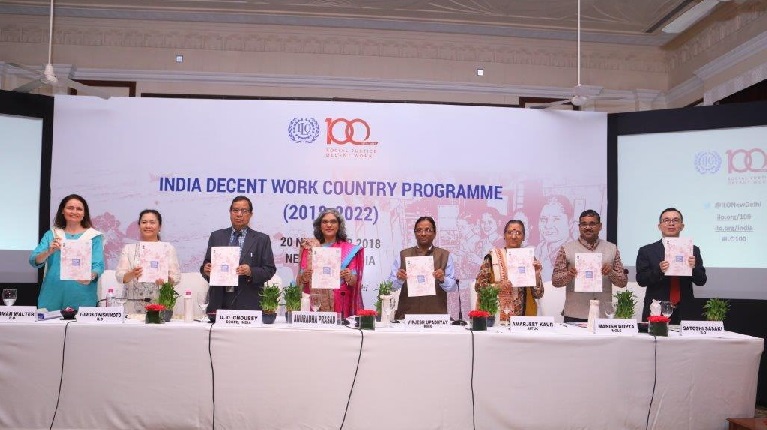Decent Work Country Programme
ILO constituents call for quality jobs, transition to formal economy, and environmental sustainability
The India Decent Work Country Programme 2018-2022 outlines how the government, worker and employer organizations will work together for the next five years to ensure a progressive and just future of work for all.

The Decent Work Country Programmes provide a cooperation framework through which the ILO provides technical support to its member States. In the coming five years, this strategy will deliver on the following three priorities:
- Promoting, adopting and implementing international labour standards for the protection of workers from unacceptable forms of work;
- Creating sustainable, inclusive and decent employment for women and youth, especially those who are vulnerable to socio-economic and environmental exclusion and are working in the informal economy;
- Fostering tripartite mechanisms to protect the rights of workers by promoting labour administration, occupational safety and health (OSH) and social protection.
Dagmar Walter, ILO India Country Director underlined how this Decent Work Country Programme is especially significant as it is launched right before ILO begins its centenary celebrations in 2019. This provides fresh opportunity for the ILO and its tripartite constituents to reaffirm the mandate of promoting social justice and peace in the world of work. She spoke of how India is a rising power in the global south – holding an important stake in international forums like G20, BRICS, and now the International Solar Alliance.
Tomoko Nishimoto, Assistant Director-General and Regional Director, ILO Office for Asia and the Pacific, drew attention to the dynamic economic growth of the Asia and Pacific region and India’s strategic role. She shared positive and negative storylines from the recently-released flagship report of the ILO: Asia and the Pacific Employment and Social Outlook (APESO). Between 2007 and 2017 countries in this region have had 7.6 per cent annual GDP growth. Labour productivity has grown, outpacing the global average. Yet grave challenges exist such as pervasive poverty, vulnerability in employment, wide gender gaps. In fact, reaching the Sustainable Development Goal targets is getting to be difficult. “Can India turn this around? Can India find solutions and approaches to its many Gordian knots such as—a large informal economy, challenging youth unemployment, inequalities, access to social security, skills development, entrepreneurship, gender gaps, and transition to a greener economy? We have gathered here to say “Yes” to these questions,” says Nishimoto.
Representatives from workers’ and employers’ organizations called for consistent policy reforms to further enhance the quality of life for workers and ensure that the future of work is secure.
Addressing the issue of informalization, Ms Amarjeet Kaur, General Secretary, All India Trade Union Congress (AITUC), says how the trend towards contract labour has increased— a fallout of neo-liberal economic models that must be checked. She says that trade unions were also hoping that with the focus on International Labour Standard promotion in this Decent Work Country Programme results in the ratification of Convention 87 Freedom of Association and Protection of the Right to Organise Convention and Convention 98: Right to Organise and Collective Bargaining Convention, among other.
Dr Choubey, representing employers, spoke about skill-development in new areas of work and how India’s IT sector is a proven success in the west. Warning against protectionist measures by developed nations, he says that there’s a need to review these measures so as to allow the workforce to migrate more freely.
India is a founding member of the ILO since 1919 and will mark its 100th year anniversary in 2019. Tripartite partners commented how they are especially looking forward to the implementation of the India Decent Work Country Programme as it provides them the opportunity to bring in fresh achievements during the centenary year and beyond.